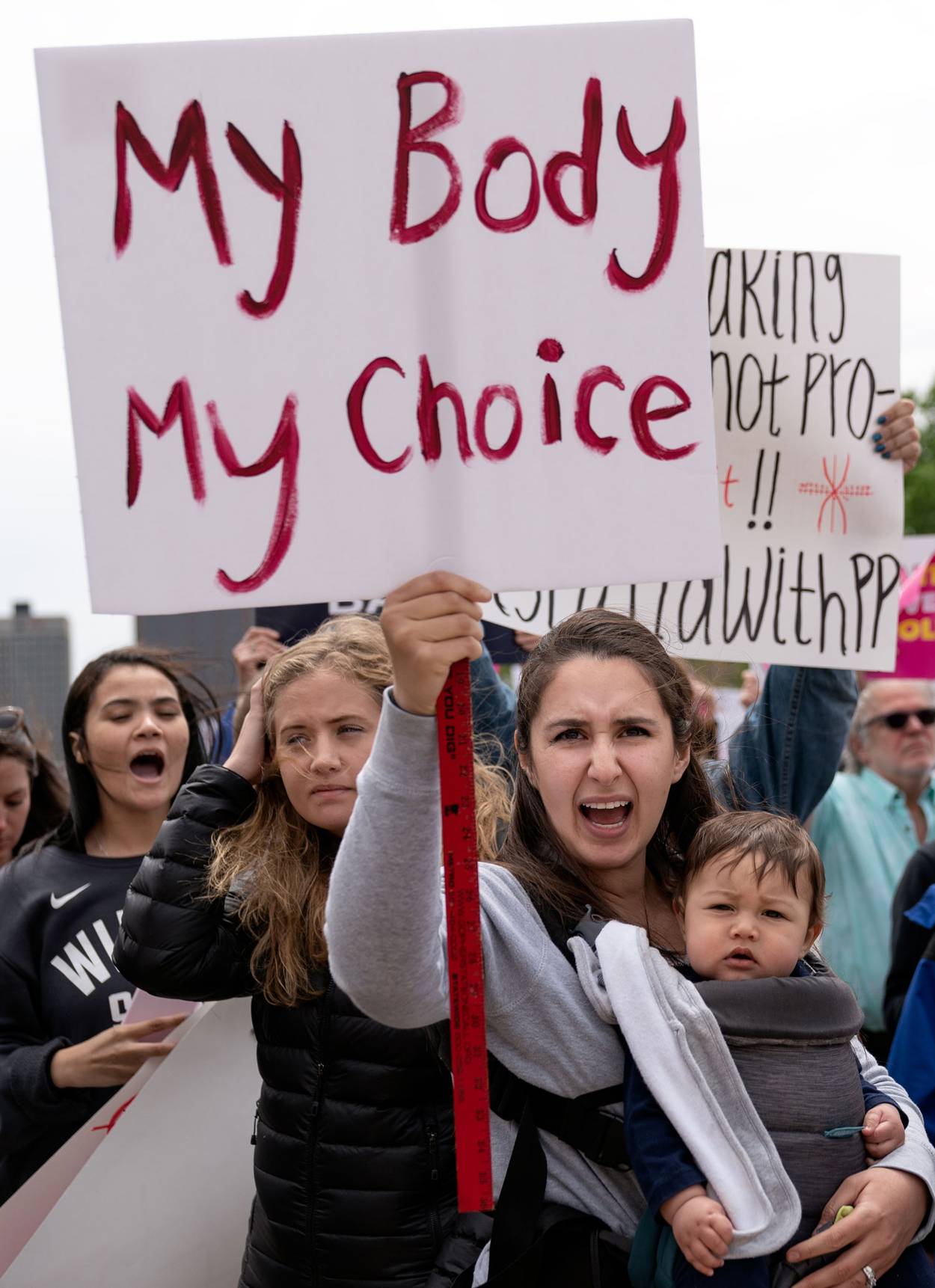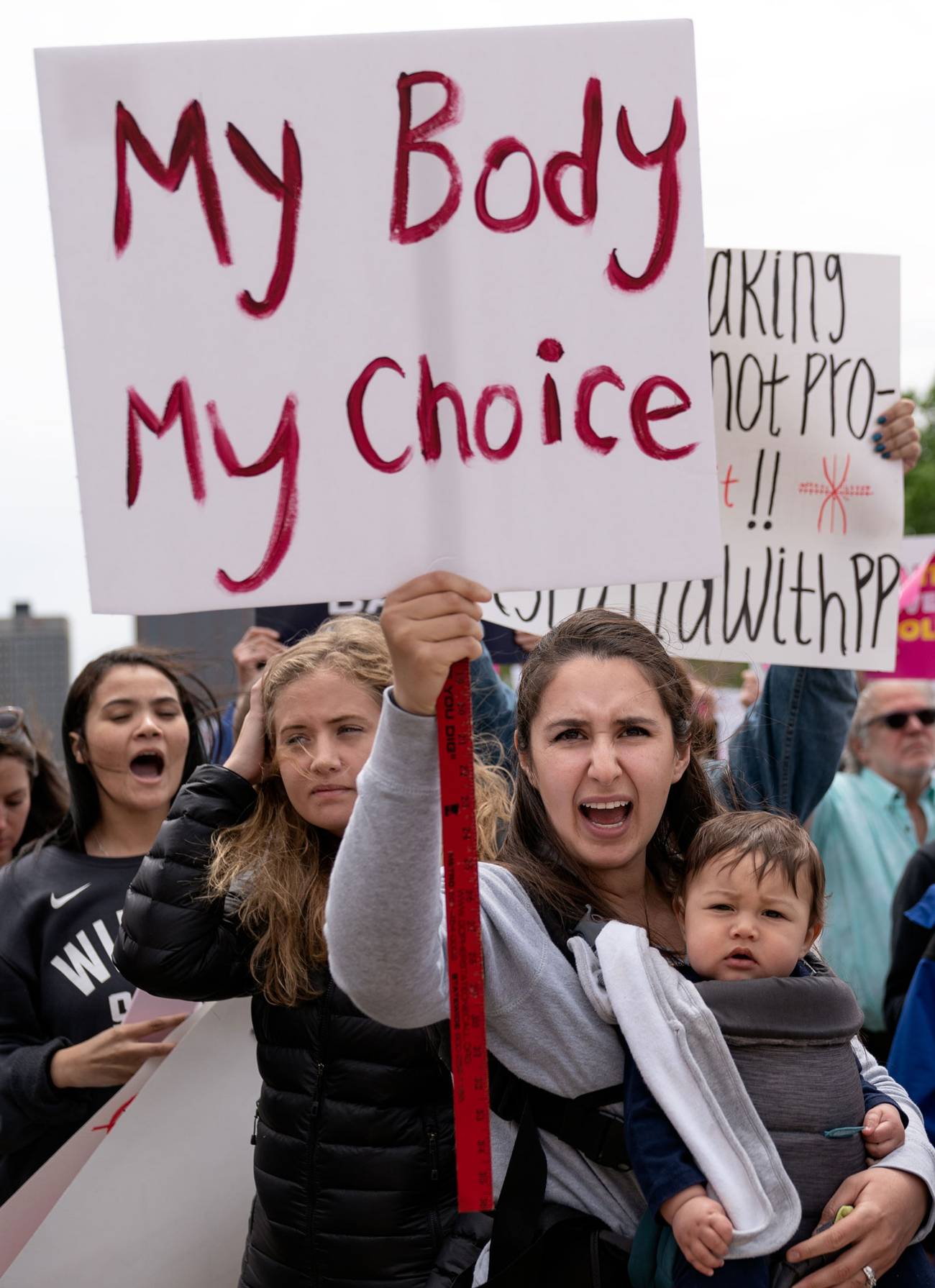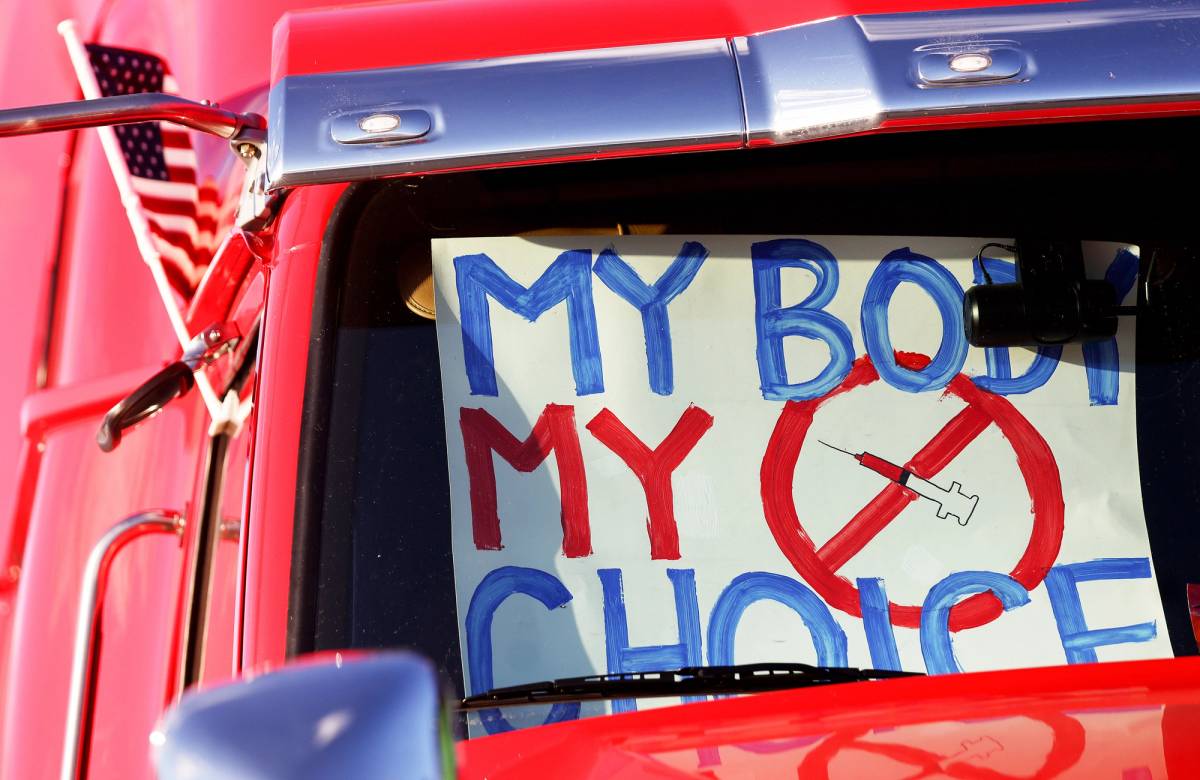My Body, My Choice?
The abortion debate has been irreversibly altered by the partisan biopolitics of COVID




Americans are in for a season of newly impassioned, embittered, and urgent debate about abortion. In our media and legislatures, the familiar rhetoric of “abortion rights” or protecting “life” will be wielded by the left and right, respectively. But to anyone who has been paying attention over the last two years, the terms in which the issue of abortion is usually framed will have become untenable, undone by the biopolitics of COVID.
Since the spring of 2020, we have seen the left, which had for half a century brought forward the line “my body, my choice” whenever abortion rights were threatened, jettison their commitment to bodily autonomy and to the existence of a private realm in which personal medical and sexual choices could be sheltered in opacity. Now, in the face of a new epidemic, progressives insisted, individuals could no longer be trusted to make their own decisions about health. And not without reason. The very idea that we have “our own” health and “our own” bodies is belied by infectious diseases that circulate among us without our consent. Bodies are not singular territories the “autonomy” of which can be defended. They swarm with foreign entities, which flow in and out of them; they teem with other lives, human and nonhuman. Although it might be otherwise in poor taste to compare pregnancy and disease, they both remind us of this inescapable dimension of human embodiment. The body we call ours is always the site of something, or someone else, and thus a matter of legitimate concern to other people, and to the laws we make together.
The left, if it takes stock of the disaster of the last two years—or of the longer-running slow disaster of American health, in which our life expectancy, already a scandal among the economically developed nations, has stagnated and even declined—must realize that the principle of “autonomy” in matters of health has in fact long served their enemies better than themselves. After all, conservatives’ long-standing resistance to any substantive improvement of our medical system has been couched in the language of “choice.” Of course, to those dying early deaths or bankrupted by medical bills (or both), such freedoms are farcical. Given a historic opportunity to articulate the case against this shallow, self-destructive conception of liberty, the left instead spent the past two years arguing instead that Americans should fall in line behind scientific experts—only to snap back, as soon as the subject of abortion loomed, to a populist discourse of trusting women to make their own decisions.
The left, however, is not sure that “women” exist, or what they are, and its standard-bearers cannot possibly believe, if they have even the slightest degree of intellectual coherence, that theirs is the party of trusting people to choose what medical treatments to pursue. Surely a left that has had its eyes opened to the problems of bodily autonomy as a political ideal, cannot now appeal to principles it has abandoned? If bodily autonomy does not keep Americans from wearing masks or taking vaccines, why should it permit them to get abortions?
Conservatives cannot rejoice at the left’s awkward situation. They are just as mired in self-contradiction. The most thoughtful right-wing critics of COVID-era biopolitics and state overreach attacked the left’s claims of protecting abstract “life,” for the sake of which officials suspended such civil rights as the freedom of religious assembly. Such critics observed that there is no such thing as “life” in this homogeneous, empty sense, only specific lives and ways of living that were endangered precisely by the state’s efforts to eliminate epidemiological risk. Attempting to make a world in which everyone was spared, to the greatest degree possible, any danger of untimely death, by this logic created a world in which the protection of mere biological life annihilated many possibilities for meaningful lives for individuals and communities.
This was, at its worst, the sort of argument that kept bathhouses open during the height of the AIDS crisis—or a pseudo-philosophical alibi by which those who had never cared about protecting the elderly, the poor, and the sick, could give a veneer of sophistication to their indifference to suffering. But there was also something true and important to this line of thought, one that kept alive an intuition that had been, in the years after 9/11, much more keenly understood on the far left than among members of Republican Party: that in the name of “safety” a liberal government can easily become authoritarian, and that freedom is inseparable from risk.
Conservative intellectuals during COVID suddenly discovered liberal principles, although they did not necessarily acknowledge that they had done so. In the years before COVID, many thinkers on the Anglophone right had been moving away from traditional liberalism towards a still-inchoate “post-liberal” perspective, making much noise about the “common good” and “solidarity.” There was an effort, always more discursive than real, to put together a new kind of conservativism that would be oriented toward the material needs of ordinary Americans, usually described as “workers” and “families” (language that might suggest certain populations imagined not to work or have families do not have needs worth addressing).

But when COVID began, the right fell back on the liberal rhetoric of rights and bodily autonomy that even the left no longer believed. Conservatives seem to have immediately forgotten about post-liberalism as they urged Americans to defend their essential freedoms even if their exercise posed a grave danger to the most vulnerable (the elderly, immunocompromised, etc.). The “common good,” but not when it’s inconvenient.
Some figures on the Catholic right, such as Ross Douthat, argue—concealing their glee at the repeal of Roe—that a new pro-family conservative movement could bring to America the sort of policies that already exist in nearly every other developed country, making bearing children less expensive, less dangerous, and therefore more desirable. This argument was echoed by figures on what is supposedly the Catholic left, like Elizabeth Bruenig. But this outcome seems so unlikely as to be scarcely worth discussing. Not only is it in opposition to the financial interests of the forces that control the Republican (and Democratic) Party, but it is hardly in line with conservative intellectuals’ critiques of COVID policies.
If in our moral and political calculus we give less weight to the life of an elderly person with, statistically, a few years left to live—and this is not an unreasonable decision—then we seem to have already accepted the notion that a woman with her whole life ahead of her should likewise mean more to us than a fetus that qualifies as “alive” only in the barest, most strictly biological, of senses. Either we are interested in protecting an abstract, universal “life” embodied in all human beings or we are not. Either we believe in “bodily autonomy” or we do not. And it seems, in both cases, that for some time we have already stopped believing. If the coming months of debate over abortion—sure to be vicious and tiresome—do nothing else of good, they might, perhaps, free both the right and left from these dead concepts. If, that is, Americans can face the contradictions in which the biopolitics of COVID have caught them.
Working through the intellectual incoherence that the COVID era has revealed—the scrambling of our received notions about rights and individual freedom, the strange game of swapping places that left and right have played with each other—will mean accepting the agony of democratic debate.
An open secret of our democracy is that Americans, we citizens of a country that has known no other regime and has been imagined by its most brilliant statesmen as an attempt to prove that collective self-government can endure, hate it. The Supreme Court’s recent decision to overturn Roe v. Wade has returned abortion to democratic politics, to state-level and national debates. Its consequences may soon likewise reopen such apparently settled issues as the legality of contraception, gay marriage, and sodomy.
While religious conservatives appear delighted—and some accelerationist fraction of the illiberal left mistakenly pleased by the thought that the court will have made itself illegitimate in the eyes of the broad public—even many of those uncomfortable with abortion must wonder whether our civic peace, so frayed after the past several years of increasingly loud and stupid dissension, can survive another debate over an issue that seems to divide the country more or less in half. But there is little room in our political culture—which means, really, in our own souls—to set prudence and the pursuit of concord above the immediate assertion of one’s conscience or one’s advocacy for the supposed rights of the oppressed (in this case, the unborn).
We may hate democracy because it thrusts issues that seem untimely, inconvenient, wildly distracting, and discord-sowing, to the forefront of our attention just when other matters—inflation, infrastructure, war—require perhaps already more thoughtful concern than we are capable of giving. Democracy means endless interruptions upon the careful concentration of statecraft, the resurgence of what we had taken to be settled problems and the insurgence of new, once unimaginable ones. It means never feeling we can sit down and breathe, even when, after the last several years of instability, we seem to have neither the personal nor the collective capacity to face another crisis.
Yet our civic duty as democratic citizens binds us to remain limitlessly receptive to such demands, to keeping our focus broken open by the latest news. The pleading and warning imperatives that hit our email inbox from party fundraisers, which always imply our not having sent $15 last month, our not having voted in an obscure byelection, our inadequate, impermanent vigilance, is the reason things are as bad as they are. And they are, in a way, right; democracy means having only ourselves—or each other—to blame.
We may also hate democracy because it threatens us, forever, with the prospect that what we had imagined as our rights—or the rights of people we care about—will vanish, to the public, lurid pleasure of others. What we had taken to be utterly private, intimate parts of ourselves, the use of our bodies and expression of our desires, suddenly appears to be a matter for our fellow citizens, many of whom we take to hate us (and we them), to debate and decide upon. One of the reasons we have a concept of “rights” and judicial institutions that interpret their scope and application is precisely to remove certain questions about what can be done to and with our bodies from the intensity and publicity of democratic political life, which is, by its nature and necessarily, a matter of our neighbors commanding us.
When we say, “keep your laws off my body,” we are making—usually without admitting it—an anti-democratic demand. And a dishonest one. Our bodies, after all, are that to which the law applies (it cannot, yet, touch our souls). Only a handful of anarchists and antinomians want to free bodies from the law. Rather we are hoping that for some particular set of bodily actions, the law that regulates our bodies will be an undemocratic one, decided and defended by judicial experts. But, in a polity like ours, judges cannot preserve issues indefinitely from the contentions inherent to democratic life.
For many years, we had concealed our unhealed and perhaps insuperable disagreement over abortion through a variety of fictions. We claimed that we trusted women to make their own choices—as if abortion were a procedure individual women did to themselves, not one done to them by doctors, whose ability to perform a given procedure is determined by institutions that are themselves regulated by the state. (This point applies, of course, to debates over medical transitioning as well. Nearly all of us accept that the state and a range of medical institutions overseen by it have the authority to tell doctors what they can do to patients; there is no question, except in some libertarian fantasy, of people doing what they want with their own bodies, when what they want includes surgery).
We claimed that we valued the life of every person, that we wanted to foster a “culture of life” in which human dignity would not be despoiled by callous selfishness (which we nevertheless accept, even celebrate as the engine of our economic life). In right-wing rhetoric, the archetypal woman who gets an abortion is an egocentric career woman who, vicious or deluded, thinks only of her own future, forgoing the joys of motherhood (never mind that women who get abortions neither reject the principle of motherhood nor, generally, forgo having other children). Such an imagined person looks not so different from the real conservatives for whom the inconveniences that seemed necessary to save others’ lives during COVID were intolerable violations of a self-centered vision of liberty.
We claimed that we believed in rights—of women, of the unborn—and that these set limits to what was politically conceivable or desirable. But conservatives and progressives alike have shredded the myths that had, however inadequately, covered this unresolved conflict (as if there were not enough matters of contention already out in the open!) and gave coherence to their own sides. The debate about abortion has been blown open, in two senses. First, its opponents and defenders now have real stakes to their previously often abstract debates—but, just as importantly, both sides are now riven by an intellectual inconsistency that may, if we face it steadily enough, hold the conditions for, if not a consensus on the issue by which debate would be lastingly resolved, perhaps at least a new fiction to replace the ones we have discarded.
When we argue about abortion, we are arguing not only, or primarily, about rights, the degree to which we trust women, the legal or biological status of fetuses, and other such questions. We are fumbling, angrily and confusedly, around questions about how we should relate to our bodies, sexualities, and their ability to create new life—what Hannah Arendt (in her epochal The Human Condition) called “natality,” and what she argued was the very heart both of politics and of being human.
Blake Smith, a contributing writer at Tablet, lives in Chicago.